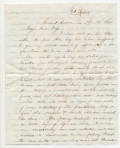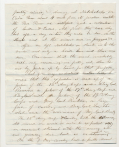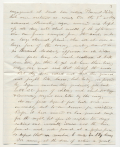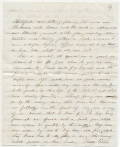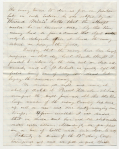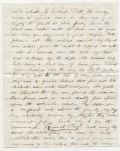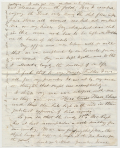site search
online catalog
DETAILED RED RIVER CAMPAIGN CONTENT : APRIL 1864 UNION SOLDIER LETTER - BREVET BRIGADIER GENERAL ISAAC DYER, 15TH MAINE INFANTRY
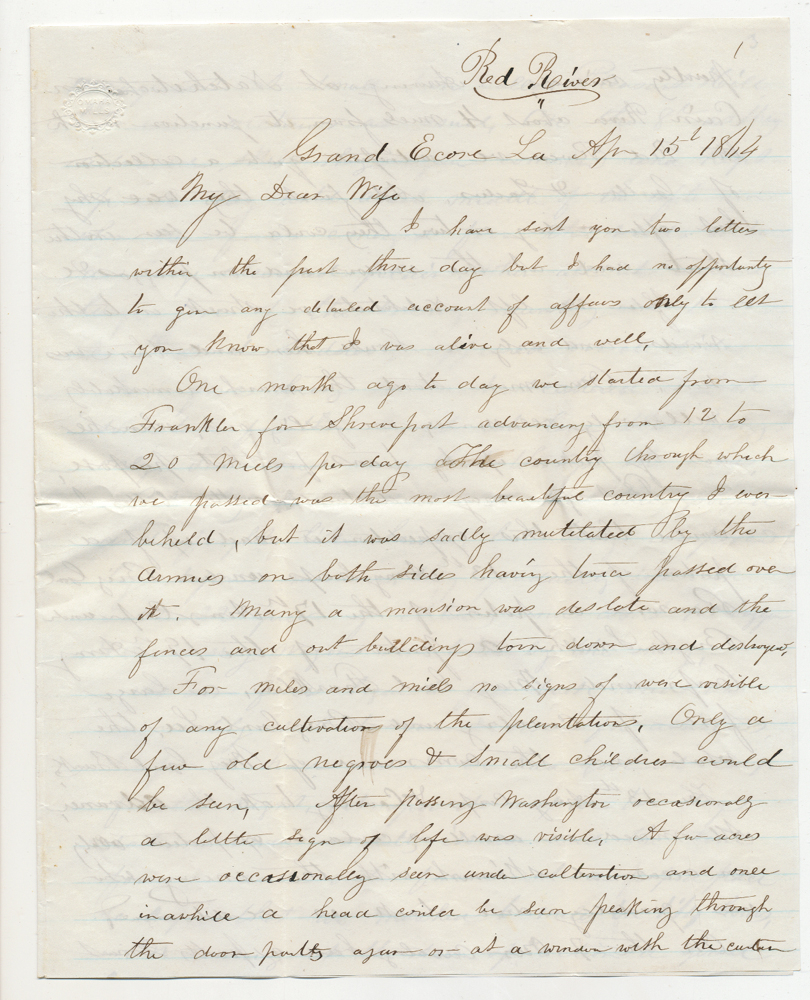
$950.00 SOLD
Quantity Available: None
Item Code: 1097-200
The letter below is one of a series of 27 letters written by Colonel Dyer to his wife Lydia between August 31, 1862 and August 11, 1865.
A resident of Skowegan, ME, 42 year-old Captain Isaac Dyer was placed in command of the 15th Maine in August 1862 and received his appointment to replace Colonel Worder in September--his appointment to Lt. Colonel (and eventually Colonel) being made official, Dec. 12, 1862. He then commanded the unit through the remainder of the war, and received a Brigadier’s Brevet for meritorious service, March 13, 1865. Resigning from service, Sept. 13, 1865, he returned to Skowegan, lived to age 92 and was buried there in 1913. His 15th Maine served in Louisiana and Florida, participating in the 1864 Red River Campaign, and later in Virginia and was present at the Bermuda Hundred. During service it lost 5 men killed and 343 by disease for a total of 348. and was buried there in 1913, at age 92.
Isaac Dyer was a well-educated, highly articulate correspondent and a shrewd observer of men and events. In this letter—{Dated “Red River / Grand Ecore La Apr 15th 1864”—6 pp. in ink on lined paper, 9.75” x 7.75---exhibiting fold-marks., else VG}—Dyer writes his wife a lengthy account of 15th Maine activities during the ’64 Red River Campaign, an ignominious debacle in which Gen. Banks was humiliated by an inferior force commanded by Gen. Dick Taylor. Full text as follows:
“One month ago to day we started from Franklin for Shreveport advancing from 12 to 15 miles per day. The country through which we passed was the most beautiful country I ever beheld, but it was badly mutilated by the armies on both sides having twice it. Many a mansion was desolate and fences and out buildings torn down and destroyed.
For miles and miles no signs of [life] was visible of any cultivation of the plantations. Only a few old negroes & small children could be seen. After passing Washington occasionally a little sign of life was visible. A few acres were occasionally seen and once in awhile a head could be see peaking through the door partly ajar or at a window with the curtain partly raised. Arriving at Natchitoches on Cain River about 4 miles from its junction with the Red River we witnessed quite a collection of Gentlemen and ladies. At first they were shy but after a day or tow they could be seen in the streets and at the windows and piazzas.
After we left Natchitoches we struck on to the woods and only a house here and there was seen. Our men stood the march remarkably well, only occasionally one falling out, when he was picked up by teams for that purpose.
That you may understand matters better I would say that this expedition is made up of a portion of the 13th Army Corps under Brig. Genl Ransom, a portion of the 17th Crops under Brig. Genl. Smith, a portion of the 19th Corps under Maj. Gen. Franklin, a large force of cavalry under Brig. Genl. Lee, the whole under the command of Maj. Genl. Banks.
The 13th Army Corps & Cavalry took the advance. All moved on as well as could be expected. Only an occasional skirmish with the enemy who was gradually riven back as we advanced.
On the 7th our cavalry had a pretty smart engagement at a small town called Pleasant Hill, but were victorious as usual. On the 8th as they advanced skirmishing again commenced and kept up all day until about middle of the afternoon, when our forces emerged from the woods on to a large cleared plain, when all at once a large force of the enemy numbering some 15 or 20 thousand suddenly appeared on all sides. Our forces being so much scattered it took some time for them to get into line there being only one road and that through the woods. But they soon rallied and stood their ground and fought like heroes, but being overpowered by superior numbers, they gradually fell back until 27 pieces of artillery and about 100 baggage & commissary wagons were taken by the enemy.
As our forces began to fall back word was immediately sent to our Division for assistance. Before it had arrived we had moved into camp for the night, but upon its reception two days rations were immediately issued and the line formed and on order formed at a proper place. So we march 6 miles in 1 ¼ hours. On arriving at the scene of action a general stampede was taking place, the road was blocked with teams and the woods on either side was latterly jammed with fleeing cavalry, men, teamsters and Army followed. Such a scene I have never witnessed before. Officers singing out to us that we had better retreat as all was lost.
For a moment the crowd was so great we halted to let it pass when I gave my men command to load and fix bayonet and then forward march. The crowd turned to our right and left and soon we found ourselves in the open and my regiment and the 140 New York took position on the left of the First Brigade which had already formed. Sharp firing was passed on by the enemy during this time, but there was no faltering on the part of my men or any of the Division that I know of. The line being formed we opened with a brisk fire which was replied to quickly by the enemy. My men were ordered by me to lie low and fire, which they knew how to do, by so doing the enemy bullets passed over their heads. Those times the enemy tried to drive us from on position but on each instance he was notified by a “Thousand Minie” balls that the attempt would be a ruinous one. By this time evening had so far advanced that objects could only be distinguished close at hand. The enemy retired and we held the field.
Knowing that the enemy had been largely reinforced on that day Genl Banks thought it prudent to retire by the same road we had advanced, and at 10 o’clock we quietly left the field leaving one of my men dead but bearing the wounded away.
We marched all night and arrived about 9 O’clock at Pleanst Hill where we had encampted the night previous,. At this time larger numbers of the enemy Cavalry had come with our rear and were severely annoying our troops. Uopn consultation it was decided that we should wait here and see what conditions would assume. Accordingly we were placed into a line of battle and laid down to rest. Fortunately a division of the 17thy Army Corps here joined us and we felt in good spirits.
At about 4 o’clock P.M. the enemy made general move on the side of us trying to flank us while pressing hard the port and center until the pressure was so great the line gave way and a general stampede took place. At this critical point my regiment was ordered from the right to support the center.
As I arrived near the spot my soul was sickened by the sight. All seemed lost, but seeing a short lane behind some buildings which the enemy were trying to gain I sung out to the top of my voice for my men to form behind that and take deliberate aim. And trust consequences. As quick as thought the line was formed, the men on their knees and a most deadly fire opened on the astonished rebels. They stopped for a moment and returned the fire by my boys, being constantly reinforce by stragglers they soon commenced falling back when I gave the command “Forward Boys”, and way they went the rebels fleeing like deer before hounds. About the same time a general forward movement was made by our rallied forces and the enemy was cleared from the field.. How I escaped injury the Lord only knows. The shot flew like hail stones all around me but one touched me or my horse. My adjutant was shot in the arm and had to be left hospital in the hands of the rebels.
My officers and men behaved well, so well that we were complimented by our generals for good conduct. My men kept together and to this I attribute to the smallness of the ___.
I feel that to my heavenly father I owe all for my preservation. It was not by my wisdom or strength that ought was accomplished.
I think my men were satisfied ied with me as they gave me “Three times Three Cheers” and threw their hats high in the air in their jubilant expression of kind regards.
So you see that the rowdy 15th ME Regt. has at last accomplished a little something for our country. We are now fortifying this place , the object being I suppose to make it the Hd. Quarters for the present / Love to you and Albert.”
A magnificent 15th Maine collectible. Dramatic Red River “after action” report, from their admirable Colonel to his wife. [JP] [ph:L]
~~~~~~~~~~~~~~~~~~~~~~~~~~~~~~~~~~~
THIS ITEM, AS WITH ALL OTHER ITEMS AVAILABLE ON OUR WEB SITE,
MAY BE PURCHASED THROUGH OUR LAYAWAY PROGRAM.
CLICK HERE FOR OUR POLICIES AND TERMS.
THANK YOU!
Inquire About DETAILED RED RIVER CAMPAIGN CONTENT : APRIL 1864 UNION SOLDIER LETTER - BREVET BRIGADIER GENERAL ISAAC DYER, 15TH MAINE INFANTRY
For inquiries, please email us at [email protected]
Most Popular
Historical Firearms Stolen From The National Civil War Museum In Harrisburg, Pa »
Theft From Gravesite Of Gen. John Reynolds »
Selection Of Unframed Prints By Don Troiani »
Fine Condition Brass Infantry Bugle Insignia »
British Imported, Confederate Used Bayonet »
Scarce New Model 1865 Sharps Still In Percussion Near Factory New »
featured item
LARGE FRAMED RELIC SHOWBOARD
This relic board is very like those assembled from Gettysburg relics by John Rosensteel and displayed on the porch of the Round Top Museum, but differs in displaying the relics on horizontal rather than raw vertical boards, in having a glass frame,… (1242-06). Learn More »



